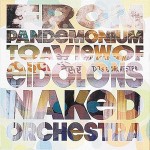 Large ensembles in creative music are largely a labor of love, a testament to the musicians’ respect for the bandleader, and a tangible manifestation of a music community. The Naked Orchestra is certainly all of these, and the fact that it’s persevered for over a decade without any official institutional support speaks volumes to both Jonathan Freilich’s tenacity and the dedication of the 23 musicians that join him for this second release by the band, recorded just days prior to Hurricane Katrina.
Large ensembles in creative music are largely a labor of love, a testament to the musicians’ respect for the bandleader, and a tangible manifestation of a music community. The Naked Orchestra is certainly all of these, and the fact that it’s persevered for over a decade without any official institutional support speaks volumes to both Jonathan Freilich’s tenacity and the dedication of the 23 musicians that join him for this second release by the band, recorded just days prior to Hurricane Katrina.
The Naked Orchestra engages with the fundamentals of the big band while also drawing freely from other musical continuums without subscribing to a particular “school” of jazz or improvised music. You won’t find any faux-swing or neo-trad on From Pandemonium…, nor will you find any extended frenetic blow-outs, but you will find music that is made with an awareness of all of these elements helmed by a strong, composerly hand and rich in rhythmic and melodic interplay.
The most obvious models for this approach are the orchestras of Duke Ellington and Sun Ra, both acknowledged influences on Freilich and the band, and both composers who included seasonings and favors from other musical cultures of the world as Freilich does occasionally here. But that’s not all he learned from these two masters. Like the bands of Ra and Duke, the Naked Orchestra thrives on (relatively) consistent personnel and composing with these musicians in mind, musicians Freilich knows well from years of playing with them in scores of bands.
Given Freilich’s extensive experience playing a range of musical styles, the concern would be that he’d steer the orchestra on a course of overarching eclecticism, but his compositions here are focused and personal. Likewise, the soloists add compelling statements to the tunes without showboating, while the rhythm section balances their textures and dynamics. Fans of such strong players as Jeff Albert, Tim Green, Martin Krusche and the late Hart McNee will get an earful of them on this recording, but they’ll likely find surprises from Steve Bertram (on bassoon!) and Chris Kohl’s excellent bass clarinet solo on “Baghdad.”
Dr. James P. Walsh conducts the orchestra and contributes four compositions of his own to the program, bringing a stentorian force to the proceedings on “Everywhere is a Now” and guiding the band through its moments of collective improvisation. Criticisms? I’d like to hear them misbehave a bit more and give the tunes some roughing-up, but that’s a taste thing and hardly a drawback to a CD as assured and satisfying as this one.




